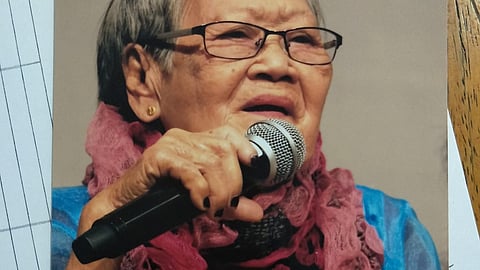
- NEWS
- the EDIT
- COMMENTARY
- BUSINESS
- LIFE
- SHOW
- ACTION
- GLOBAL GOALS
- SNAPS
- DYARYO TIRADA
- MORE

One of the last surviving Filipino "comfort women" from the Japanese occupation in the country passed away.
Lola Estelita Dy passed away on 24 November due to cardiac arrest. She was 94.
Lila Pilipina, an organization of World War II comfort women announced her passing.
According to Lila Pilipina, Lola Estelita was at her home “in the loving care of her daughters.”
“Until her recent stroke, Lola Estelita served as the voice of the survivors, ardently speaking out against wars of occupation even as her health turned even more frail,” the organization stated.
“Lola Estelita was a true warrior for peace, an inspiration for many women in the country and in Japan.”
Her message often centered around the need for vigilance among young people, who will be most affected by imperialist wars.
“I actually do not expect to see justice in my lifetime," she once said.
“But what is more important to me is that young people do not experience wars of occupation, like we did."
Lila Pilipina held a tribute to Lola Estelita on Thursday night at her wake in Malabon.
“Her courage in speaking truth to power inspired generations of Filipino women to stand against historical revisionism and wars of aggression,” the organization added.
Lila Pilipinas said until Lola Estelita’s last breath, “she remained steadfast in demanding justice and proper compensation from Japan, while educating younger generations about the atrocities of war and sexual slavery.”
“We honor her memory by continuing the struggle for genuine justice and women's liberation. The fight of our comfort women survivors is the fight of all Filipino women,” it added.
Lola Estelita was 14 years old when she was abducted and forced into sexual slavery by Japanese soldiers during World War II.
She remained in captivity for three weeks.
Lola Estelita kept her ordeal from her family until 1993 when she, along with hundreds of Filipino women, came forward publicly as comfort women to demand historical inclusion and accountability from the government of Japan.
Last year, the Committee on the Elimination of Discrimination Against Women (CEDAW) said the Philippines violated the rights of victims of sexual slavery committed by the Japanese Army in World War II.
The United Nations (UN) committee recommended that the complainants receive from the State party "full reparation, including recognition and redress, an official apology and material and moral damages."
Senator Risa Hontiveros, who has authored laws against sexual violence, abuse, and exploitation, has filed a resolution in 2023 that urges the government to ensure just and meaningful reparations are given to Filipino "comfort women" and their families after a UN committee called out the Philippines on the elimination of discrimination against Women.
According to Hontiveros, there are only 17 “comfort women” in the Philippines today.
The Presidential Communications Office, meanwhile, pointed out that "some reparations have been made and the Supreme Court has adjudicated on the matter.”
In 1956, Manila and Tokyo signed a reparation agreement, under which Japan would provide the country with services and goods valued at the equivalent of $550 million.
